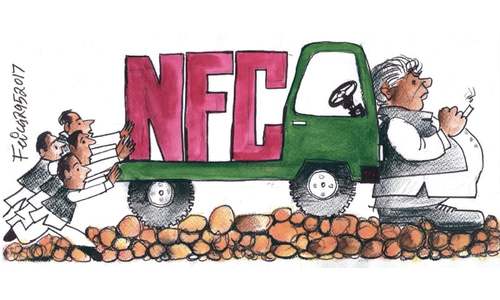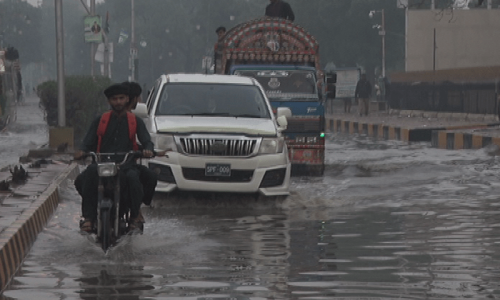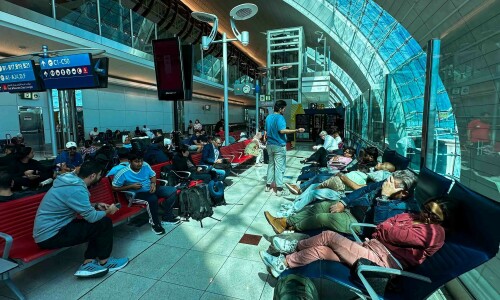True to its character, an over excited PML-N government chose to focus on the positives, underplaying the disturbing negatives, including the external front vulnerability.
Finance Minister Ishaq Dar presented a typical election year budget that seeks to expand subsidies, development spending and direct transfers to poor under the Benazir Income Support Programme (BISP).
Not necessarily enthused by the claims of economic achievements by the finance minister in wake of persistent painful electricity outages, citizens are trying to demystify the government’s assertions and look through the jugglery of numbers to assess the impact of the national budget on their family budget.
The slew of measures such as continuation of energy subsidy, rise in limit of minimum annual taxable income from 0.5 million to 0.6m, 10pc increment and adjustment of previous adhoc bonus in salary and pensions of government employees, easier accessibility of housing loans, concessions and duty cuts for the farming community are expected to marginally improve the well being of an average middle class family.
On the basis of an informal survey of business professionals and economists Dawn has identified households with an average monthly family income in the bracket of Rs75,000 to Rs180,000 as urban middle-class members.
In this income bracket seven broad categories of spending and a weightage range has been worked out: kitchen 20-30pc; rent 20pc; health and education 10-20pc; income tax 10pc; transport 10-15pc; utilities 10-15pc; savings 0-5pc.
According to the initial assessment, the overall impact of the budget on an urban middle-class, fixed-income, salaried family, assuming everything else the same, would be positive and could free up some resources for health/education or savings.
The kitchen budget will increase by the rate of inflation. The concessions to builders/construction material and accessibility of housing loan may moderate pressure on rentals. Transport cost may also remain the same over the year ahead if the government absorbs variation in oil prices, but utility prices could rise moderately.
When the assessment was shared with an economist he got annoyed. “What relief? It is this salaried class that takes the hardest hit. They pay income tax as their tax is deducted at source, in addition to indirect taxes on consumption of goods, besides surcharges hidden in the utility bill”, he said.
“In a country where economic disparity is high but the government relies on indirect taxes for resource generation to support over-bloated, highly inefficient, structures there would always be misallocation of resources, inefficiency and inequity”, he argued.
An economist at the Pakistan Institute of Development Economics (PIDE) did not contest the assertions stated above but defended the current government in comparison to the earlier.
“No one is saying that future has arrived in Pakistan but there is no harm in admitting a fact — the current government’s economic management is better those of the earlier ones”, he said.
Dr Nadeem Javed, Chief Economist, Planning Commission, talked at length about constraints the government had to operate under. “Within limitations the government has been trying futuristic solutions.
“In a spirit to evolve solutions based on collective wisdom we have persistently been engaging with stakeholders outside the government. In the current budget vulnerable sections and IT/innovation has particularly been facilitated”, he said.
“To manage external sector challenges, measures have been announced to discourage import of non-essential goods and sectors with potential of export have been incentivised”, he added.
“If the government can glorify its performance as much as it wants and project CPEC as an answer to all problems in absence of a better choice, it might beat other parties at the ballot again next year, but to my mind the country will again land in a crisis if policy orientation is not changed”, a senior economist warned.
Expanding on his idea of reform he advocated a greater role for longer term planning to transform the basic character of the state in Pakistan. “Only a peaceful, social welfare state that not uses the masses but actually tries to serve them in cooperation with neighbouring nations has a future”, he argued.
An earlier survey by Dawn showed that the wellbeing of Pakistani families on the two extremes of the social scale is comparatively insulated from the direct impact of the taxation measures on their wellbeing.
The poor are outside the income tax net and their consumption of essentials have little or no tax. They often pay a flat rate for utilities that themselves are often accessed informally. Though steps in the budget, such as minimum wage rate and cash relief, affect them directly.
On the other extreme, for ultra rich families, taxation measures might affect their wealth accounts but not their lifestyle or wellbeing. Their consumption makes a small fraction of their wealth so the impact of consumption tax as a percentage of income is nominal compared to middle class families.
Published in Dawn, The Business and Finance Weekly, May 29th, 2017
















































